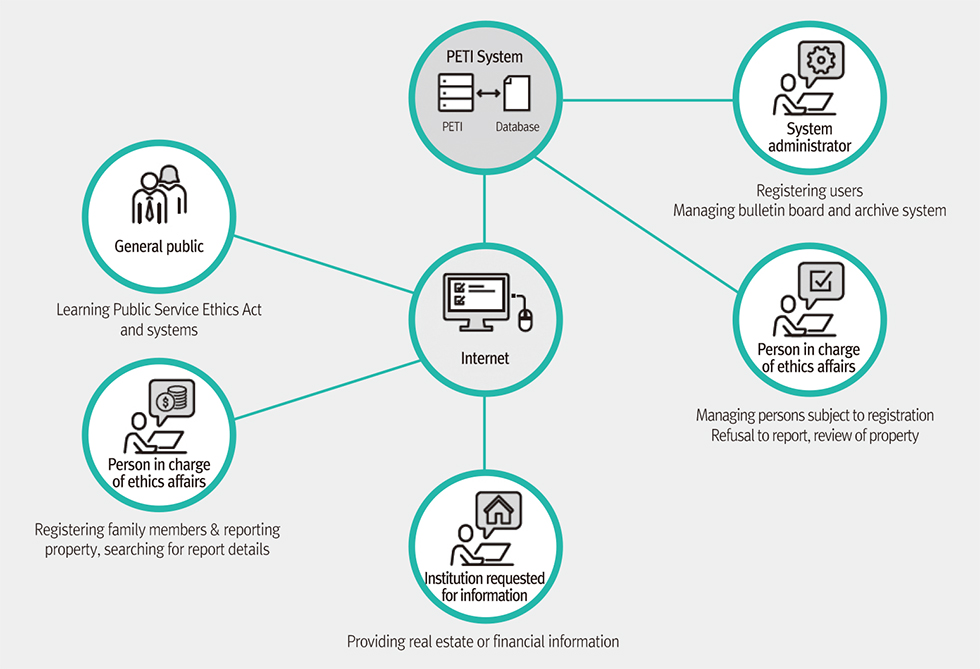Property Registration System for Public Officials
Background
The Public Service Ethics Act (enacted on 31 December 1981 and enforced on 1 January 1983) was enacted to prevent improper enrichment of public officials and to ensure fairness in the execution of official duties, which led to the declaration of public officials’ property and review of the disclosed and registered property. In the beginning, when a person subject to property registration submitted a property report containing information about the status of his/her property to the person in charge of ethics affairs of the agency, the person in charge conducted a property review by manually comparing paper report submitted by the official and the documents issued by financial institutions and others. This was not only inconvenient for property reporting, but also time-consuming and uneconomical for the person in charge of handling the work.
Therefore, in order to provide convenience for property registration to persons obligated to register property and to efficiently support property review work of the person in charge of ethics affairs, the property registration system and property review system were established and operated respectively in 1999, which later evolved into the Public Ethics and Transparency Initiative (PETI)* System.
(Public Ethics and Transparency Initiative) : https://www.peti.go.kr/indexEn.do
Major Developments
Starting with the establishment of programs for PCs in the initial stage, the property
registration system was rebuilt based on the web in 2005 and operated for 10 years after integrating the property registration and review system in 2008. In 2018, the government comprehensively transformed the aging system to the next-generation PETI system which systematically and efficiently supports the overall public service ethics programs, such as property registration and disclosure, property information review, blink stock trust, gift reporting, employment screening on retired public officials, and others. Currently, PETI System is used by more than 230,000 people in 1,500 organizations, such as the National Assembly, the Constitutional Court, central administrative agencies, local governments, education offices, and public service-related organizations.
A person subject to property registration reports using a series of functions related to property registration on the System, such as registration of personal and relatives’ information; application and permission for refusal to register property information by family members other than dependents; submission of consent for the provision of financial information and real estate information; reporting of 16 items of property, including finance, real estate, debt, etc.; and submission of explanatory materials for the process of acquiring property.
A person in charge of ethical affairs of each agency manages the persons subject to property registration, and generates a property report; reviews the consent for the provision of financial and real estate information, and requests relevant data; selects and reviews the subject of property information review; reviews and approves report refusal applications; and others through the system.
A personnel in an agency that provides financial and real estate information, etc. offers property information online, such as financial balance information, real estate (land and building) information, and membership information of the person subject to property registration upon the request of provision.
In addition to property registration and review, the system supports various public service ethics tasks, including the examination of blind stock trust and job relevance for the stocks a person owns, the management of employment restrictions on retired public officials (such as management of those subject to employment review, employment review and approval, confirmation of violations, etc.), and the reporting of gifts received from foreign governments.
In order to enhance citizens’ understanding of the PETI System and their trust in public officials, the website provides information on public service ethics, such as the Public Service Ethics Act, property registration and review, blind stock trust, restrictions of employment and activities on retired public officials, reporting of gifts, and others.
Functional diagram on PETI system applicability by user type

Achievements
The development of the PETI System made it significantly easier for those subject to property registration. They can now search for their financial transaction and real estate information, etc. upon submission of the consent over providing their information without visiting financial institution, etc. one by one; and report their property over the system in any place where the Internet is available. It also has saved considerable amounts of time and financial costs that once required for visiting multiple institutions and issuing different sets of financial transaction and real estate information from the offices. Before the PETI System, apart from the psychological burden in registering their property and being under review, the time and financial cost required also contributed to the negative perception of individuals subject to property registration. However, as the System has saved the individuals from the time and money, they have come to more faithfully report the property.
Furthermore, compared to the past when individuals had to visit relevant institutions, issue required documents one by one, and fill out the report form based on the documentation before submitting the form to declare their property, now the system helps the officials subject to registration accurately and conveniently report without any information left out by allowing them to check information transferred by financial and real estate information provider institutions in the system before declaring property.
Personnel in change of ethics affairs, too, are benefiting from the system where it relieves them from the inconvenience of exchanging documents with hundreds of data provider institutions to acquire data necessary for reviews, while allowing them to digitally process all the relevant work, including property review and its disclosure, which has substantially increased efficiency and accuracy of the duty to ultimately contribute to better public service ethics.